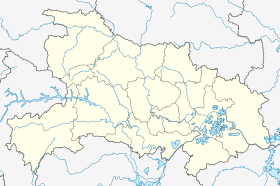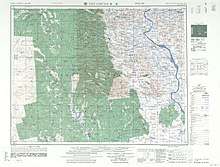Yicheng, Hubei
Yicheng (Chinese: 宜城; pinyin: Yíchéng) is a city in northwestern Hubei, People's Republic of China. It is under the administration of Xiangyang City.
Yicheng 宜城市 Icheng, I-ch'eng, Tzu-chung | |
|---|---|
 Yicheng Location in Hubei | |
| Coordinates (Yicheng government): 31°43′16″N 112°15′25″E | |
| Country | People's Republic of China |
| Province | Hubei |
| Prefecture-level city | Xiangyang |
| Area | |
| • County-level city | 2,115 km2 (817 sq mi) |
| • Urban | 48.00 km2 (18.53 sq mi) |
| Population (2010)[1] | |
| • County-level city | 512,530 |
| • Density | 240/km2 (630/sq mi) |
| • Urban | 188,800 |
| Time zone | UTC+8 (China Standard) |
| Website | ych |
History

In 1945, in order to commemorate the anti-Japanese generals Zhang Zizhong in the Battle of Zaoyi, renamed Zizhong County, belonged to the Office of the Administrative Inspector of the Fifth District of Hubei Province. After December 1947, the area east of Hanshui was under the jurisdiction of the Communist Party of China. After July 1948, the west of Hanshui was under the jurisdiction of the Communist Party of China. In 1949, Yicheng County was restored and it was subordinated to the Commissioner of the Xiangyang Administrative Region of Hubei Province.
In June 1994, Yicheng County was cancelled and Yicheng City was established with the approval of the State Council.[1]
Geography
Yicheng City is located in the northwest of Hubei Province, Hanjiang midstream. East boundary Suizhou, Zaoyang, south Zhongxiang, Jingmen, west Nanjing, north to Xiangyang. It is located at 111°57′-112°45′ east longitude and 31°26′-31°54′ north latitude. It is 76 kilometers long from east to west and 53 kilometers wide from north to south, with a total area of 2115 square kilometers.
Administration
Yicheng administers 2 subdistricts, 8 towns, and 3 other areas.[1][3][4]
Two subdistricts:
Eight towns:
- Zhengji (郑集镇), Xiaohe (小河镇), Liuhou (刘猴镇), Kongwan (孔湾镇), Liushui (流水镇), Banqiao (板桥镇, or Banqiaodian 板桥店镇), Wangji (王集镇), Leihe (雷河镇)
Three other areas:
Demographics
At the end of 2006, the city's total population was 564,500, of which the urban population was 226,600, the rural population was 335,900, the annual birth population was 4,770, the birth rate was 8.45 ‰; the death toll was 3,278, the mortality rate was 5.81 ‰; the natural growth rate was 2.64 ‰.
Historical Figures
Songyu, Xianglang, Xiangpang, Maliang, MaWei, Zhongliang, Wangning, Zhou Renshou, Lu Guiyuan, Wang Wanfang, Duancheng, Wang Yi, Zhang Zizhong
References
- 宜城市历史沿革 [Yicheng City Historical Development] (in Chinese). XZQH.org. 6 August 2014. Retrieved 12 September 2018.
1994年6月10日,民政部批复(民行批[1994]93号)撤销宜城县,设立宜城市(县级),以原宜城县行政区域为宜城市行政区域。{...}1995年,宜城市面积2115平方千米,{...}2010年第六次人口普查,宜城市常住总人口其中:512530人,鄢城街道133877人,南营街道42060人,郑集镇69169人,小河镇50922人,刘猴镇31807人,孔湾镇19514人,流水镇49832人,板桥镇40391人,王集镇34258人,雷河镇36498人,大雁工业园区4202人。
- Ministry of Housing and Urban-Rural Development, ed. (2019). China Urban Construction Statistical Yearbook 2017. Beijing: China Statistics Press. p. 66. Retrieved 11 January 2020.
- 行政区划 [Administrative Divisions] (in Chinese). Yicheng People's Government. 13 April 2017. Retrieved 12 September 2018.
宜城市现辖8个镇、2个街道办事处,1个经济开发区,1个工业园区。小河镇、郑集镇、孔湾镇、刘猴镇、雷河镇、王集镇、板桥店镇、流水镇、鄢城街道办事处、南营街道办事处、宜城经济开发区、大雁工业园区。
- 2017年统计用区划代码和城乡划分代码:宜城市 [2017 Statistical Area Numbers and Rural-Urban Area Numbers: Yicheng City]. National Bureau of Statistics of the People's Republic of China. 2017. Retrieved 12 September 2018.
统计用区划代码 名称 420684001000 鄢城街道办事处 420684002000 南营街道办事处 420684102000 郑集镇 420684103000 小河镇 420684104000 刘猴镇 420684105000 孔湾镇 420684106000 流水镇 420684107000 板桥镇 420684108000 王集镇 420684109000 雷河镇 420684400000 襄南监狱 420684401000 劳教所 420684450000 大雁工业园区 420684452000 宜城经济开发区